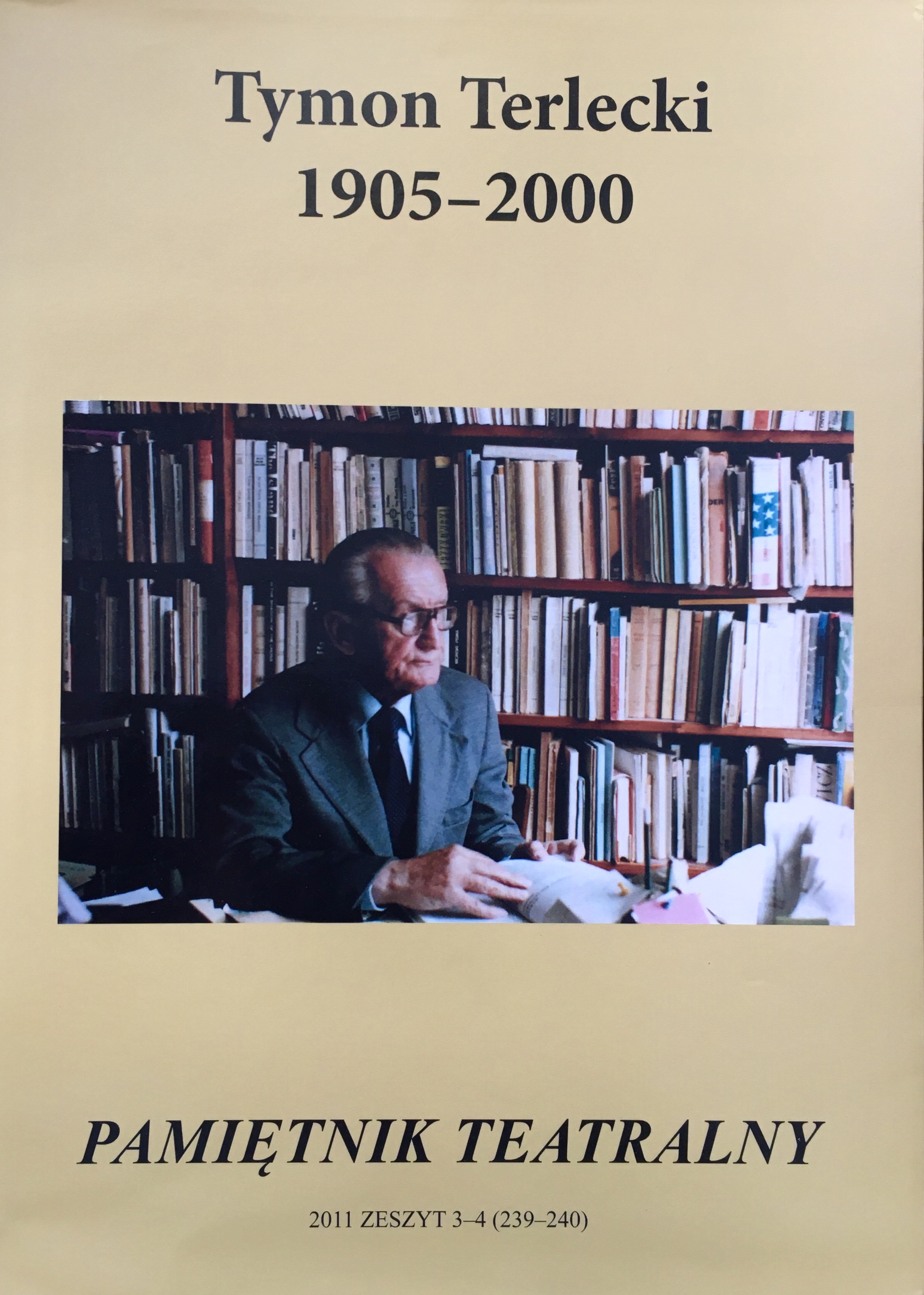Tymon Terlecki. Kronika życia i działalności (1905–2000)
Tymon Terlecki. A Chronicle of His Life and Work (1905–2000)
Author(s): Nina Taylor-Terlecka, Edward KrasińskiSubject(s): Theatre, Dance, Performing Arts
Published by: Instytut Sztuki Polskiej Akademii Nauk
Keywords: Tymon Terlecki;
Summary/Abstract: Tymon Terlecki was born on 10 August 1905 in Przemyśl, Galicia, in the part of Austro-Hungarian Empire gained by the partition of Poland, as a subject of Emperor Franz Josef I. Since the autumn of 1911 he attended a six-grade Popular School. In the September of 1914, after the outbreak of the First World War, his family was evacuated to Neufeld in Moravia. In 1915, Terlecki moved to Lvov and studied at two Lvov middle schools. In the autumn of 1924, he began studying Polish philology at King John Casimir University in Lvov, but having contracted tuberculosis had to take two breaks from his course of study and get treatment in Zakopane. In 1930, he started publishing literary criticism and theatre reviews, mostly in Słowo Polskie daily; he also actively participated in the artistic and literary life of Lvov and cooperated with the radio. In June 1932, Terlecki was awarded a Phd diploma for his dissertation on the poet and writer Ryszard Berwiński (1819–1879), written under the tutelage of Professor Juliusz Kleiner. In 1932–1934, Terlecki lived in Paris and studied at the Sorbonne and College de France onscholarship from the French government. He travelled to Spain and visited England, Belgium and the Netherlands. On his return to Poland, Terlecki lived in Warsaw where he lectured drama History at the State Institute for dramatic Art (Państwowy Instytut Sztuki Teatralnej), and since 1936 edited two periodicals: Teatr, and the exemplary theatrological quarterly Scena Polska. He also collaborated with Tygodnik Ilustrowany weekly, Pion and Życie Sztuki. In July 1939, Terlecki went for treatment to France and upon the outbreak of the Second World War joined the Polish Army. In the military camp in Coëtquidan, Brittany, he became editor of Polska Walcząca weekly, the official organ of the Polish Armed Forces in the West, which he then edited in Paris and, after evacuation to England, in London from June 1940 until the end of 1948. In London, he became an initiator of the literary, artistic and scientific life of Polish emigrants, and organised unions of Polish artists and writers abroad. In 1964, Terlecki was invited to teach Polish Literature classesas a visiting lecturer at the department of Slavic Languages and Literatures at the University of Chicago, and after two semesters accepted a permanent teaching position as professor of Polish literature, which he held until 1972. After retirement, he taught at seminars and lectured as a senior visiting professor at the State University of Illinois at Chicago Circle (1972–1977). during the Chicago period, Terlecki participated in numerous conferences, published articles on Polish literature and the theatre, as well as on ethnical and national diversity; he visited many educational and research centres, giving lectures in Jerusalem, detroit, New York City, Washington dC, Montreal, Buffalo, New Orleans, and Los Angeles. Terlecki constantly observed the scientific, literary and artistic life in his home country, which he was not allowed to visit; he received guests from Poland and promoted them in Great Britain and the United States. In the summer of 1972, Terlecki went to Paris for a three-month scholarship of the American Council for Learned Societies to do research on Wyspiański and Craig. In 1973 he was finally granted US citizenship; until then, as a stateless person, he had had only a British travel document. In June 1978, he returned to London and continued his activities in the scientific and literary life of the Polish emigrants. He resumed teaching at the Polish University Abroad. At the turn of 1981 and 1982, he toured the US and Canada, giving lectures on literature and theatre at universities and academic institutions (among which were Ann Arbor, Harvard, and Columbia University). In 1983, he published in Boston an English monograph, Stanisław Wyspiański, in Twayne’s World Authors Series.
Journal: Pamiętnik Teatralny
- Issue Year: 240/2011
- Issue No: 3-4
- Page Range: 18-200
- Page Count: 183
- Language: Polish

